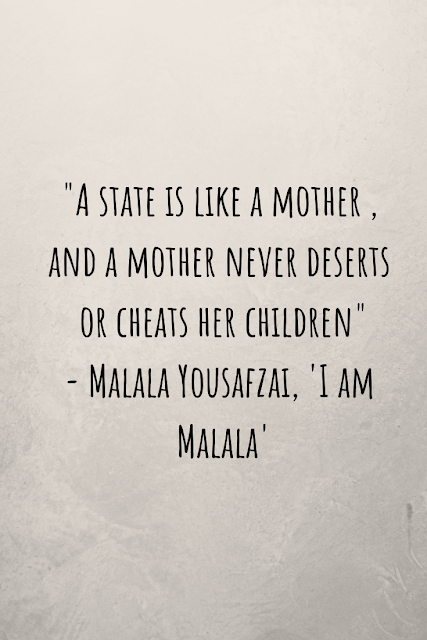I've always known Malala as 'the girl that got shot in the head by the taliban'; this book is all about delving beyond that and looking into Malala: the girl who fights for girls' education. It's so easy to get swept up by little titbit's about a person's character and label them as one thing, and I think it's so important for books, especially autobiographies like this one, to remind us that this is not the case.
This was actually my first read of the year, and something that I've been on the lookout for for a LONG time. I rarely (if ever) buy brand new books and reading this as part of my work book club group gave me the nudge I needed to depop myself a copy.
I am Malala starts off looking into Malala's life up to her attack. She describes what it was like to live in the absolute beauty spot that is Swat Valley (honestly - google pictures of this because wow the media has never shown me this side of Pakistan??). She describes the changes that were made as the Taliban took over this tourist destination, how they were helped by American forces (an absolute eye-opener) and how everything got a lot more dangerous.
Malala's father is a massive source of inspiration in her life. As someone with a lot of teaching experience, he founded his own school in their village. It was a co-ed, so taught both boys and girls. As the Taliban became more powerful and restricted the education rights of girls, this became more and more difficult for him. Malala and him attended conferences together on education where she began to speak out about why girls need to be educated as well as boys. Between this and her decision to not wear a hijab as she was instructed to, Malala became a target.
The book details her attack and recovery. On her way home from school one day Malala was shot in the head and underwent a whole lot of medical procedures to bring her back to the health she feels today. But, in order to receive the treatment, Malala was brought to the UK alone. A terrifying experience, it was still a tough adjustment when her parents came to join her.
One of the most poignant and important aspects of the book in my opinion is this last part where Malala speaks about what it's like to live in the UK. Her life is in danger if she ever returns to Pakistan and so she doesn't have a choice about being here, and was flown whilst unable to make a decision about moving. She speaks out about how horrible it is to come to a new country that is utterly different to yours, and how heart-breaking she finds the idea of not being able to return to live in Swat Valley.
In the UK there's a whole wave of people that think refugees should be grateful that they're 'allowed' to live here, and that they're somehow less worthy if they miss home or admit that the UK isn't some paradise. I think so much work needs to be done to confront and tear down this narrative, and that Malala does this in a way that is easy to empathise with in her book.
The other thing that is very important to remember when reading this is that Malala was a child when she wrote this. We laud her up as a perfect Nobel peace prize winning symbol of bravery, but she was a child and some of her narrative reads like that. She speaks about how annoying her brother is and sometimes the text can seem a little juvenile. But, I do think it's important that this is the case, as it forces us as readers to remember that Malala is just a girl. An important and very brave girl, but still a girl.

No comments:
Post a Comment